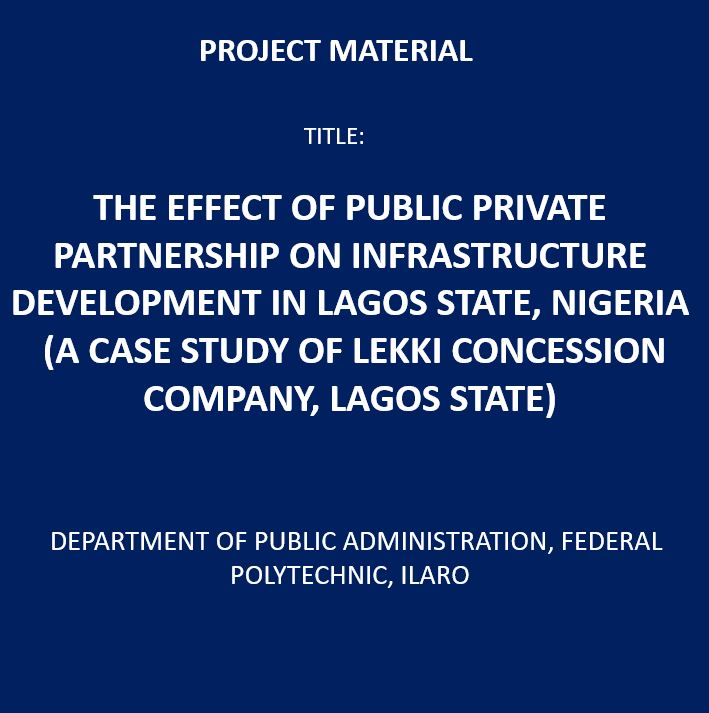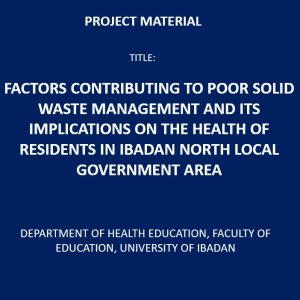No products in the cart.
The Effect of Public Private Partnership on Infrastructure Development in Lagos State, Nigeria
₦10,150.00
THE EFFECT OF PUBLIC PRIVATE PARTNERSHIP ON INFRASTRUCTURE DEVELOPMENT IN LAGOS STATE, NIGERIA
- CASE STUDY: A CASE STUDY OF LEKKI CONCESSION COMPANY, LAGOS STATE
- NUMBER OF PAGES: 61
- FILE TYPE: DOC - CHAPTER 1 -5
- DEGREE: HIGHER NATIONAL DIPLOMA
- DEPARTMENT: DEPARTMENT OF PUBLIC ADMINISTRATION, FEDERAL POLYTECHNIC, ILARO
BACKGROUND TO THE STUDY
Public Private Partnership (PPP) is therefore a model of public procurement based on long-term relationships between government or other public bodies and the private sector for the delivery of services. It is the emphasis on service provision, and length of relationship where a government may engage a private sector to construct an asset, or deliver equipment. In recent years, the governments in a number of countries have publicly encouraged their local authorities or other government bodies to consider the advantages of contracting with the private sector for the long term provision of capital intensive services through PPP type arrangements. Public-Private Partnerships (PPP) represents an alternative economic arrangement to traditional public infrastructural financing, and has been widely acknowledged as a potentially important instrument to drive development goals. This is an arrangement whereby government design project for infrastructure development and the private may provide the finance or maintenance or both for the execution of the project. Recently, the governments are being faced with increasing demand to finance the rising expectation of their citizens amid continue drop in revenue and economic crises causing infrastructure finance deficit. It has therefore become a responsibility to the government to seek alternative project funding to provide basic services to the citizens regardless of the economic resources at the disposal of a country.
The modern concept of Public-Private Partnership is believed to have originated in the United Kingdom. It is said that the initiatives emerged in the United Kingdom which was similar to the model used to facilitate independent power projects in the United States of America in the 1980s (Augustine, 2018). Thus while it can be said that the emergence of modern forms of PPPs may be traced to the Private Finance Initiative (PFI) scheme of the United Kingdom that was launched in 1992, the template for modern Public-Private Partnership contracts may be traced to Power Purchase Agreements (PPAs) signed by the US authorities and independent power producers in the 1980s.( Augustine, 2018) Even though the modern concept of PPP is relatively new, the idea of toll roads and bridges are not.
The adoption of Public Private Partnership gained prominence in Nigeria towards the end of 1990s. This has been linked to the end of military rule and the incoming civilian governments need to make substantial investment to close the infrastructure gap in the country as a result of many years of neglect. In order to achieve this, the Federal Government inaugurated the Infrastructure Concession Regulatory Commission (Commission) to facilitate the implementation of the new partnership programme between government and the private investors in Nigeria. As a first step towards establishing the proper legal and regulatory environment to attract private sector investors, the Federal Executive Council approved the National Policy on Public Private Partnership, sponsored by the Commission after stakeholder consultations and technical inputs from, inter alia, the World Bank and the United Kingdom Department for International Development (DFID). The key PPP principles driven by the Commission are: value for money; public interest; output requirements; transparency; risk allocation; competition and capacity to deliver. (Toyin and Oluwatoba, 2019)
This policy sets forth the ways in which private investment could be leveraged in tackling the menace of poor infrastructure stocks and boosting delivery of services to the public in a manner that is sustainable. This is pursuant to sections 33 and 34 of the Infrastructure Concession Regulatory Commission Act (ICRCA) which empower the Commission to take directives from the President regarding matters of policy and power to make regulations, respectively. There are economic, social and environmental objectives for the adoption of PPP model as a strategy for infrastructure development. It is the belief of the government that a private-sector led drive for infrastructure development through PPPs will open up the infrastructure and service delivery landscape in Nigeria to efficiency, inclusive access and overall improvement of the quality of public service delivery in a sustainable way. In pursuit of this lofty agenda, they came up with a supposed more investor-friendly legal and regulatory environment so that the provision of infrastructure assets and delivery of services to the public could be private-sector driven.
The essence of government is primarily to cater for the citizens. In this regard, the government has varieties of responsibilities to deliver to the citizens particularly in the area of service delivery such as health, education, transportation, etc. Besides, Investment in infrastructure is critical to economic growth, access to education, healthcare, poverty reduction, general quality of life, and achieving many of the goals of a developing economy. The provision of adequate and reliable physical infrastructure is important given the role it plays in supporting the growth of industry, delivery of social services, enabling the movement of people and goods, amongst others (Akano, 2008). According to Salako (2000), service delivery is the actual and effective provision of a service such as collecting refuse and disposing it, lighting the streets, provision of drainage etc. He discussed further that service delivery by the government has the primary intention of transforming the citizens and making their life more meaningful. As a crucial responsibility of government, the government is expected to deliver services that the citizens in their area of jurisdiction need to maintain and improve their welfare.
On the other hand, the private sector consists of all establishments created with private initiatives and funding, and owe their survival to the ability and diligence of the entrepreneurs and the operators. With the exception of Trust-funds, Non-Governmental Agencies, clubs and other social and privately funded charitable organizations, the private sectors always have a profit motive. In fact their growth and survival is premised largely on their ability to consistently make profits. The private sector clearly demonstrates a more efficient user of resources relying on the simple laws of management. The private sector as far as Nigeria is concerned consists of big companies like the giant multinationals, medium and small scale industries, privately established banks, educational and agricultural institutions, peasant farmers, road side mechanics, artisans, technicians etc. The sector can also be said to include establishments where the government has some shareholding (majority or minority) but are managed by private initiatives with profit motives to a reasonable extent.
As the major determinant of economic progress and employment creation, Olaniyi (2016) sees the private sector as a central place in renewed efforts to reduce poverty and achieve the Millennium Development Goals (MDGs). The United Nations has grown to recognize the important role the private sector can and must play in sustainable development. Thus, the development of entrepreneurship and a broader set of relevant productive capacities in agriculture, manufacturing and the services sector (tourism), and there deployment of resources into activities with higher productivity lie at the heart of self-sustaining and lasting economic growth. As governments establish stable macroeconomic environments, enact policies to facilitate economic diversification, and have primary responsibility for education, infrastructure and other public goods, the private sector plays a role in enhancing productive capacities and entrepreneurship. In essence, the private sector helps lead investment in productive capacities and builds entrepreneurship: it can drive development of technology, provide capital, build skills and capacities of employees and suppliers, and engage in dialogue around policy and institutional constraints (see United Nations, 2011).
Public-private partnership (PPP) came into being as a result of the continued budgetary constraints faced by the various governments and public sector institution in providing adequate service for the citizens. Public/Private Partnership (PPP) therefore is a form of relationship between the government with the aim of working together to provide public goods and services (agriculture, communication, infrastructure etc). This initiative has been adopted across the world as suitable alternative for the provision of capital project. Public-Private Partnership has provided opportunity for many countries in regard to developing their infrastructure base. Public Private Partnership (PPP) is a key policy instrument that is being used to transform public services delivery system. Public Private Partnership is a contractual arrangement which is formed between public and private sector partners which involve the private sector in the development, financing, ownership, and or operation of a public facility or service.
In public private partnership initiative, public and private resources are pooled and responsibilities divided so that the partners’ efforts are complementary. The private sector partner usually makes a substantial cash or equity investment in the project and the public sector gains access to new revenue or service delivery capacity. Public Private Partnership involves the public and private sectors working in co-operation and partnership with each other (Harris, 2003). It is essentially a partnership between public sector organizations and private sector investors for the purpose of designing, planning, financing, constructing, providing and operating infrastructure, facilities or related services. Successful PPPs build on the experience of each party to meet clearly defined needs and provide a net benefit (or value for money) to the general public through the appropriate allocation of resources, risks and rewards (Leiringer, 2003).
This study therefore is interested in the effect of public private partnership on service delivery in the Nigerian public sector with the aim of assessing how effective the Public private partnership programme has been able to improve infrastructure development in Lagos State, Nigeria.
- ₦10,150.00






